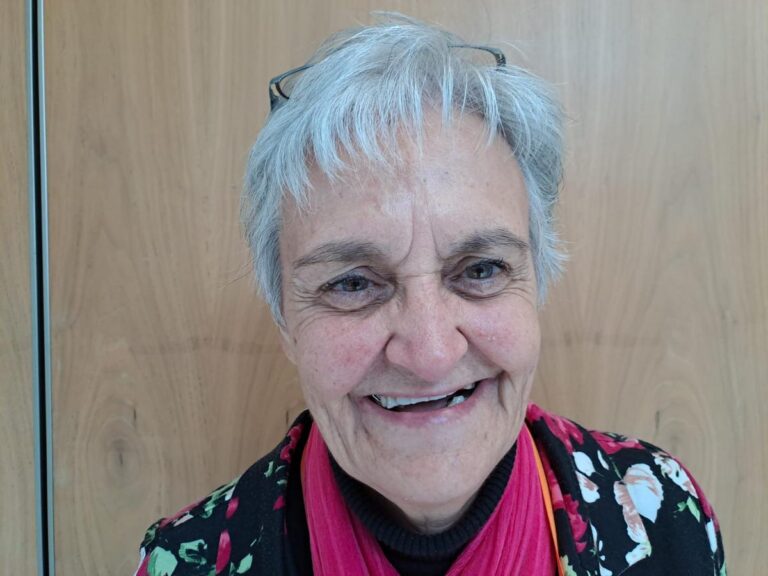
Photo: Dr Nelia Drenth, social worker and grief specialist
Drenth was addressing the final plenary session of the first national palliative care conference in six years at the Vineyard Hotel in Cape Town on Saturday, 29th April, this year.
She said her own long-term work in hospitals and hospices with people she met at the end of life and their families, including bereavement care, often left her wondering whether she could "continue giving so much of myself, given the multiple death challenges I experience.”
"Witnessing suffering affected caregivers in fundamental ways, and navigating personal and professional losses could be ‘incredibly challenging.'”
“One of the many challenges faced by us is that we have dual responsibility to effectively attach to our patients to provide quality of care while we must be able to detach when the patient dies. As a result of feeling a lack of control over death, we often seek ways to regain control through our work and relationships with other patients and their families. We hopefully recognise that everything we did for the patient and their families had an impact. Through our proactive and positive actions, we aim to recover some of our lost control,’ she said, prompting audible murmured assent.
Drenth quoted a study done by Marcella and Kelly1 in which the participants' perception was that the emotional burden of grief decreased the higher the staff member was on the professional hierarchy. She said there were many expectations placed on staff to provide emotional and informational support to each other.
“The question is whether they are skilled to do so and whether they have the capacity and resources to support each other,” she said.
Professional grief was often hidden and its expression unsanctioned. It was internalized and unexpressed; had no natural outlet, and work demands often quickly overshadowed the loss.
The term “disenfranchised grief” was used to describe grief that was not socially recognised. One study discussed nursing home staff who hid their grief because they were not “legitimately bereaved.” In a study of gravediggers, one researcher described them as “distant mourners,” witnessing the suffering of the bereaved at the cemetery but with no claim to share in the bereavement. Drenth said these concepts appeared universally applicable to professional practice in palliative care.
“We are not supposed to become “attached” to our patients and their families. We are warned about countertransference issues. We are told we should keep an emotional distance and an emotional balance. Yet, palliative care cannot be done at arm’s length, behind the protection of a professional role. Rather, it must be done through a personal connection. Palliative care is personal in nature, and we are all vulnerable to the helplessness that accompanies death” she asserted.
She described empathy as “the deliberate act of breathing for someone else who can’t find their own air.”
“I inhale your story, I exhale compassion, I inhale your words, I exhale understanding. I inhale your suffering, I exhale gentleness,” she added, quoting Wyoming writer, poet and storyteller, John Roedel.
Drenth said hidden grief could be disenfranchised, legitimately bereaved or distant mourning. Palliative care workers, like many other professionals in medicine, were highly prone to burnout, compassion fatigue and secondary traumatic stress.
Regardless of work setting, healthcare professionals who had a palliative care function and worked in high-loss situations were at risk for professional grief, burnout, compassion fatigue, and/or difficulty maintaining hope.
“We often overlook the secondary (vicarious) trauma in witnessing the suffering of those we serve. Figley coined the term ‘compassion fatigue’ and defined it “as the natural, predictable, treatable, and preventable unwanted consequence of working with suffering people.”
In palliative care, lack of support for professional grief had been shown to contribute to compassion fatigue, burnout, and poor staff retention.
How to cope – some suggestions
She suggested several strategies of self-care at the personal level.
These were to know your strengths and weaknesses, be aware of your own beliefs, values, and feelings and how they may influence your care, understanding the relationship between self-care and excellent palliative care. Other top strategies were to balance the personal, professional, and spiritual areas of your life, build a personal support system both inside and outside your work setting, allow time to deal with your emotions, and participate in a peer support network.
“Also, keep a journal of psychosocial successes, attend a retreat or conference on self-care, and seek counselling if needed,” she added.
Her suggested strategies for self-care at the professional level were:
- Recognise that palliative care will include ethical dilemmas and value conflicts.
- Ensure effective interdisciplinary teamwork that values the contributions of each discipline.
- Encourage requirements for basic and continuing professional education about palliative care.
- Increase your skill level through advanced training and supervision.
- Identify barriers to offering effective palliative care at the macro level such as access to and inequities of care.
- Join others in your organisation or community who are trying to bring about positive change regarding palliative care practice and education.
- Lobby for needed workplace support such as extra leave time and split shifts.
- Establish rituals and grieving practices for professional staff and the workplace.
- Maintain a community of hope that fosters trust and compassion, and that respects individual differences.
- Advocate for sound institutional ethics practice and adequate ethics resources.
“Ultimately, death is a difficult and complex topic to navigate, but it is a reality that many professionals face as part of their job. By acknowledging the emotional toll that personal and professional losses can have, and by developing healthy coping mechanisms and support systems, individuals can better manage these challenges and continue to provide important services to those in need,” she concluded.